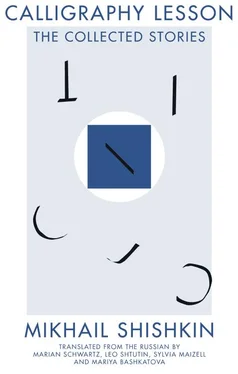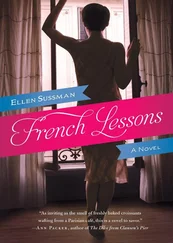Mikhail Shishkin - Calligraphy Lesson
Здесь есть возможность читать онлайн «Mikhail Shishkin - Calligraphy Lesson» весь текст электронной книги совершенно бесплатно (целиком полную версию без сокращений). В некоторых случаях можно слушать аудио, скачать через торрент в формате fb2 и присутствует краткое содержание. Город: Dallas, Год выпуска: 2015, ISBN: 2015, Издательство: Deep Vellum Publishing, Жанр: Современная проза, на английском языке. Описание произведения, (предисловие) а так же отзывы посетителей доступны на портале библиотеки ЛибКат.
- Название:Calligraphy Lesson
- Автор:
- Издательство:Deep Vellum Publishing
- Жанр:
- Год:2015
- Город:Dallas
- ISBN:978-1-941920-02-2
- Рейтинг книги:4 / 5. Голосов: 1
-
Избранное:Добавить в избранное
- Отзывы:
-
Ваша оценка:
- 80
- 1
- 2
- 3
- 4
- 5
Calligraphy Lesson: краткое содержание, описание и аннотация
Предлагаем к чтению аннотацию, описание, краткое содержание или предисловие (зависит от того, что написал сам автор книги «Calligraphy Lesson»). Если вы не нашли необходимую информацию о книге — напишите в комментариях, мы постараемся отыскать её.
Calligraphy Lesson — читать онлайн бесплатно полную книгу (весь текст) целиком
Ниже представлен текст книги, разбитый по страницам. Система сохранения места последней прочитанной страницы, позволяет с удобством читать онлайн бесплатно книгу «Calligraphy Lesson», без необходимости каждый раз заново искать на чём Вы остановились. Поставьте закладку, и сможете в любой момент перейти на страницу, на которой закончили чтение.
Интервал:
Закладка:
This “enlightened” version of the West was invented from its opposite. If Russia lives by the principle, “If you’re the boss, I’m the fool; if I’m the boss, you’re the fool,” then there they have a republic, equality, elections, and so on. If in the fatherland, “righteous labor does not build man a house of stone,” then there righteous labor does lead to a house of one’s own “with a stork on the roof,” Dostoevsky’s famous expression, in The Gambler, for Europe’s narrow burgher mentality. If in our homeland something belongs to you only until someone stronger decides to take it away, then there private property is sacred, and a peasant can be confident that his lawn will belong to his descendants ten generations hence, and so forth.
It became a book about the protracted struggle among Russian ideas, the unending national showdown, the barricades that never come down on the streets of the notorious Russian soul.
When the question arose of translating Russian Switzerland into German, I suddenly discovered that this book truly exists only along with my Russian reader. Any sentence spoken in Russian places you on one side of the barricades or the other. And in translation, it’s not just that the associations and allusions disappear—half the names require notes—you can’t even tell where the barricades are. You can translate the words, but not the reader.
Not only can no novel really be translated, neither can any word. The experience of a language and the life lived through it and any specific word make languages with different pasts noncommunicating vessels. A past alive in words defies translation, especially that Russian past which was never a fact but always an argument in the neverending war the nation has waged with itself.
If you are to build your own Russian literary ark, you have to become a hermit. Go somewhere. Anywhere—to the Alps or inward. And take along only your lived experience of love and loss and ten centuries of Cyrillic.
To know which way words are going, you need two points through which you can draw the line of motion. One point is everything written before you in Russian, beginning with the Slavonic translation of the Scriptures. The second point is you yourself, lock, stock, and barrel, and all the people you love.
If you are going to say something new, you need to feel the centuries of tradition inside you. If a button is pushed at some power plant, the light flickers in the city’s windows. So, too, in literature, if a word is written, it reverberates in all the existing books, regardless of whether you’ve read them or not.
Literary tradition is a living being. A plant.
Sap runs through the trunk to the branches. The nineteenth century is the trunk of Russian literature. Then comes the branching. There are perfectly brilliant branches, like Platonov, but this is a severed limb that cannot keep growing. You have to find the branch that reaches up, the main branch along which the tree grows skyward.
Chekhov. Bunin. Nabokov. Sasha Sokolov.
In my texts I mean to connect Western literature and its achievements in verbal technique with the humanity of the Russian pen. Joyce doesn’t love his heroes, but Russian writers do. The Russian hero is Akaky Akakievich, from Gogol’s “Overcoat.” Though there is no good reason to love him.
To know which way to go, you need to turn around and see where you’re coming from. What is genuinely new is always a development of the tradition. In order to understand the tradition, you need to discover the word’s genetic code, seek out the living DNA spiral along which you can trace where all this came from. And if you do untwist that spiral, you will arrive at He Who loves and waits for us all. You simply need to put the words in the one and only orader (which is unknown) that makes the chain of words lock on God, so that life can run down it. The writer must find the precise order that makes real blood course under the skin of the words.
Words are the material for the road. The longest and most important road. The road to the “historical homeland”—to the ultimate beginning. “In the beginning there was love. This cluster of love. Or rather, not even love yet, but the need for it, because there wasn’t anyone to love. God was lonely and cold. And this love here demanded an outlet, an object, it wanted warmth, to hold someone dear close, to sniff the delicious nape of a child, its own, flesh of its flesh, so God created himself a child to love. Nineveh” ( Maidenhair ). A novel is an opportunity to find the road to that original love. For his heroes, the author is God. The reader identifies with the hero. If the author loves his Akaky Akakievich, whom there is no good reason to love, then the reader, too, feels, knows, that God exists and loves him, though there is no good reason to. He just does. As he would his own child. This is what words are for, to pave the road to that feeling.
In time, though, any road wears out and forms ruts and potholes. Language gets played out. The road the generations have gone down becomes impassable. It grows up in clichés. You have to lay a new one. “One more novel” is written in a worn language that leads nowhere. In order to reach your goal, you need a new road, a new way of putting words together.
For me, the only way to create my own language is to write incorrectly. I sniff each sentence, and if I get a whiff of a textbook on “How To Speak and Write Correctly,” I cross it out. Saying something correctly means saying nothing. Because ever since the Tower of Babel, language has been a means of misunderstanding. Correct words, having given up the ghost, can mean anything at all except what you want to say, and they evoke a sense of disdain, like someone else’s scruffy toothbrush or a woman who has been passed around.
In the beginning there was love, not the word. The child has yet to be conceived, but the mother already loves him. And then, body inside body, love doesn’t need words. After the birth, mother and child still love each other nonverbally. Only with words, when verbal barriers arise between people who love each other, does alienation begin.
Thus, language creates barriers. Once they lost their sacral nature, words turned into a means of misunderstanding. Words don’t mean anything anymore. So you have to do something with these words to restore their original, Divine meaning.
Words are guards that keep out emotion and meaning, sentries at the boundary between people. Either you need to learn to grope your way toward understanding each other, or else be able to escape over the verbal barbed wire.
There is no road to understanding except through words.
Word corpses watch over us. The only way to get past them is to revive them. We have to breathe new life into them, so that love can once again be called love.
Each new generation of living prose is just another path leading to where each of us is loved and awaited. Tradition consists in finding language of a new clarity and writing a classic Russian novel today, a novel about love, about how God will always have compassion for Nineveh, about overcoming death, which is a boundary between people.
The Taking of Izmail is a novel about grabbing life, about overcoming death with a “collection of words” and the birth of a child. The novel’s world is constructed from the elementary particles of biographies that are more substantive than fictitious. Sentence fragments are jumbled up because the mumbling coming from the anteroom of Judgment Day cannot be coherent. There, there are no longer any “intact” physical bodies, but there is still pain, joy, fear, and love, in short, the sensation of life. The person is gone, but his breath is preserved. I collect human breath.
Language has a grammatical past and future but no past or future. In the dimension of words, time twists like a screw with a stripped thread. Time can be opened at any line. Open the first line a hundred times, and you will force Him to create heaven and earth a hundred times and race over the water. He is racing right now.
Читать дальшеИнтервал:
Закладка:
Похожие книги на «Calligraphy Lesson»
Представляем Вашему вниманию похожие книги на «Calligraphy Lesson» списком для выбора. Мы отобрали схожую по названию и смыслу литературу в надежде предоставить читателям больше вариантов отыскать новые, интересные, ещё непрочитанные произведения.
Обсуждение, отзывы о книге «Calligraphy Lesson» и просто собственные мнения читателей. Оставьте ваши комментарии, напишите, что Вы думаете о произведении, его смысле или главных героях. Укажите что конкретно понравилось, а что нет, и почему Вы так считаете.












